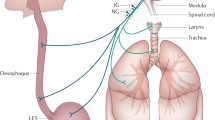Abstract
Introduction
We studied the relationship between GORD and allergic bronchopulmonary aspergillosis (ABPA), chronic pulmonary aspergillosis (CPA), or Aspergillus bronchitis.
Background
Gastroesophageal reflux disease (GORD) is well known to initiate or exacerbate pulmonary inflammatory conditions, inducing bronchial asthma and chronic obstructive lung disease.
Methods
We reviewed four patients referred with elevated Aspergillus serology markers and marked pulmonary symptoms for ABPA, CPA, and Aspergillus bronchitis, and discussed the underlying pathophysiological relationship with GORD. Data were collected retrospectively from medical records included age, gender, predisposing factors for ABPA, chronic pulmonary aspergillosis, or Aspergillus bronchitis; presence of nocturnal reflux, nausea, epigastric pain, Medical Research Council dyspnea scale score, pH manometry data, endoscopic results (ulcers, Barrett’s esophagus), treatment of GORD [proton-pump inhibitors (PPIs), surgical operation]; history of smoking, alcohol consumption; concomitant COPD; serological markers (anti-Aspergillus IgG, anti-Aspergillus IgE), and antifungal treatment.
Results
Four patients with GORD were studied; following PPIs administration two achieved clinical improvement. One had ABPA, one CPA, and two had Aspergillus bronchitis; median age was 57 years [range 39–71]; males-to-females ratio was 1:3. Serological markers for aspergillosis were: median total IgE antibodies 573 KIU/L [range 13.1–850], median Aspergillus IgE-specific antibodies 1.2 kAU/L [range <0.4–24.7], and median Aspergillus IgG titers 71 mg/L [range 20–119]. Aspergillus fumigatus grew in one sputum sample.
Conclusion
Clinicians caring for patients with gastroesophageal reflux disease presenting with elevated Aspergillus IgG or IgE antibodies should maintain a high index of suspicion for this association and proceed to appropriate evaluations, including laryngoscopy and endoscopy, initiating specific PPI-directed therapy when indicated.
Similar content being viewed by others
References
Sharifi A, Ansarin K. Effect of gastroesophageal reflux disease on disease severity and characteristics of lung functional changes in patients with asthma. J Cardiovasc Thorac Res. 2014;6:223–8.
Gause GS. Pulmonary manifestations of gastroesophageal reflux disease. Ann Thorac Med. 2009;4:115–23.
Harding SM. Gastroesophageal reflux and asthma: insight into the association. J Allergy Clin Immunol. 1999;104:251–9.
Jaspersen D. Extraesophageal disorders in gastroesophageal reflux disease. Dig Dis. 2004;22:115–9.
Gislason T, Janson C, Vermeire P, et al. Respiratory symptoms and nocturnal gastroesophageal reflux: a population-based study of young adults in three European countries. Chest. 2002;121:158–63.
Sontag SJ, O’Connell S, Miller TQ, et al. Asthmatics have more nocturnal gasping and reflux symptoms than nonasthmatics, and they are related to bedtime eating. Am J Gastroenterol. 2004;99:789–96.
Theodoropoulos DS, Pecoraro DL, Efstratiadis SE. The association of gastro-esophageal reflux disease with asthma and chronic cough in adults. Am J Respir Med. 2002;1:133–46.
Naik RD, Vaezi MF. Extraesophageal gastroesophageal reflux disease and asthma: understanding this interplay. Expert Rev Gastroenterol Hepatol. 2015;9:969–82.
Knutsen AP, Bush RK, Demain JG, et al. Fungi and allergic lower respiratory tract diseases. J Allergy Clin Immunol. 2012;129:280–91.
Denning DW, Pashley C, Hartl D, et al. Fungal allergy in asthma—state of the art and research needs. Clin Transl Allergy. 2014;4:14.
Agarwal R, Chakrabarti A, Shah A, et al. Allergic bronchopulmonary aspergillosis: review of literature and proposal of new diagnostic and classification criteria. Clin Exp Allergy. 2013;43:850–73.
Denning DW, Cadranel J, Beigelman-Aubry C, et al. European Society for clinical microbiology and infectious diseases and European Respiratory Society Chronic pulmonary aspergillosis—rationale and clinical guidelines for diagnosis and management. Eur Resp J. 2016;47:45–68.
Chrdle A, Mustakim S, Bright-Thomas R, et al. Aspergillus bronchitis in non-immunocompromised patients—case series, response to treatment and criteria for diagnosis. Ann NY Acad Sci. 2012;1272:73–85.
Joachim L, Mac N, Tore L, et al. Prospective follow up data from the ProGORD study suggest that GORD is not a categorical disease. Am J Gastroenterol. 2006;101:2457–62.
Vaezi MF. Atypical manifestations of gastroesophageal reflux disease. MedGenMed. 2005;7:25–6.
Muldoon EG, Sharman A, Page I, et al. Aspergillus nodules; another presentation of Chronic Pulmonary Aspergillosis. BMC Pulm Med. 2016;16:123.
Ashbee HR, Barnes RA, Johnson EM, et al. Therapeutic drug monitoring (TDM) of antifungal agents: guidelines from the British Society for Medical Mycology. J Antimicrob Chemother. 2014;69:1162–76.
Niece KL, Boyd NK, Akers KS. In vitro study of the variable effects of proton pump inhibitors on voriconazole. Antimicrob Agents Chemother. 2015;59:5548–54.
Jacobs SE, Saez-Lacy D, Wynkoop W, Walsh TJ. Successful treatment of allergic bronchopulmonary aspergillosis with isavuconazole: case report and review of the literature. Open Forum Infect Dis. 2017;4:ofx040.
Miceli MH, Kauffman CA. Isavuconazole: a new broad-spectrum triazole antifungal agent. Clin Infect Dis. 2015;61:1558–65.
Author information
Authors and Affiliations
Contributions
MNG reviewed the patient charts, collected, and analyzed the clinical and laboratory data, and drafted the manuscript. DWD conceived the idea, wrote the protocol, revised the manuscript, and has had the supervision of the project.
Corresponding author
Ethics declarations
Conflict of interest
The authors declare that they have no conflict of interest.
Rights and permissions
About this article
Cite this article
Gamaletsou, M.N., Denning, D.W. Gastroesophageal Reflux Disease and Pulmonary Diseases Associated with Aspergillosis: Is There a Connection?. Mycopathologia 182, 1125–1129 (2017). https://doi.org/10.1007/s11046-017-0176-y
Received:
Accepted:
Published:
Issue Date:
DOI: https://doi.org/10.1007/s11046-017-0176-y




